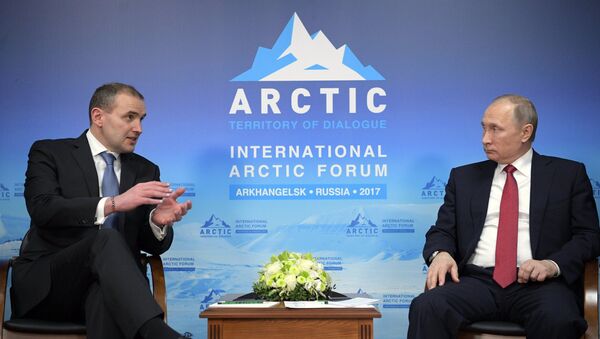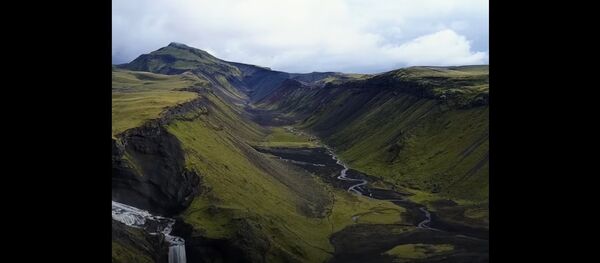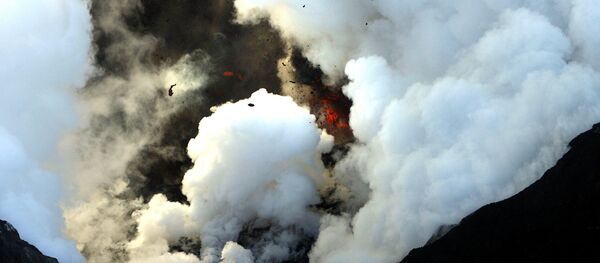Iceland’s President Gudni Johannesson told Sputnik that he was going to discuss the future of the Arctic region and the Arctic Council during Wednesday talks with Russian President Vladimir Putin.
“The agenda, of course, will be Arctic-oriented … Even though Iceland and Russia vary greatly in size and have varied interests and opinions in many matters, there is more in the Arctic that unites us than that which divides us. We agree on the need to have sustainability as the key focus in the Arctic. So I suspect that the future of the Arctic and the future of the Arctic Council will be on the agenda tomorrow”, Johannesson said.
READ MORE: UN Committee's Verdict Boosts Russia's Chances to Win Arctic Shelf Bid
Johannesson also stressed that he would not discuss anti-Russian sanctions on Wednesday, adding that there are still various opportunities for cooperation with Moscow despite sanctions. In particular, Johannesson emphasized that one of the possible spheres of cooperation is the fishing business.
“The sanctions are not directly connected with the Arctic. So I think that will be outside the formal agenda”, Johannesson said. “In terms of relations with Russia, in particular, we see many positive signs. Yes, you did mention the sanctions, and there are sanctions, which hindered previous commerce. But in other aspects our relationship is blossoming”, Johannesson said.
Despite the fact that the import of Icelandic fish to Russia has been stopped, the Joint Russian-Icelandic Fisheries Commission continues to operate. It deals with issues of allocating quotas for Iceland to fish in the Barents Sea under the 1999 Agreement between Russia, Norway and Iceland. The regular session of the commission was held in Moscow in February 2018.
“I do not know for sure that [it will]. But we see potential for further growth”, Johannesson said when asked about how much the bilateral fishery cooperation would grow. “I [am] told that the value of contracts between Icelandic and Russian economies in the fishery sector is about $170 million, which is a big figure. So I think we should continue focusing on this aspect of our relationship. We have the knowledge and the expertise when it comes to the latest developments in the fishery sector, and the people of Russia are interested in developing their fishery sector. So it’s a marriage made in heaven”, Johannesson added.
READ MORE: Iceland Okays Whale Hunting Quota of 2,000 Based on Flawed Studies — Expert
Meanwhile, Johannesson also told Sputnik the Arctic Sea Route could also become a possible point of cooperation. However, Johannesson called for less military activity in the Arctic region.
“I can safely say on behalf of Iceland that our position is that the less military activity and presence in the Arctic, the better. Apart of that, I cannot give a specific reply to this question … That is the future we will encourage”, Johannesson stressed.
On Tuesday, Russian Foreign Minister Sergey Lavrov called for resuming military consultations – particularly, meetings of chiefs of staff – between member states of the Arctic Council. Last May, Russian President Vladimir Putin issued a decree defining the national development goals for the period until 2024. Under the decree, the load of the shipping Northern Sea Route, running along the Russian Arctic coast, should reach 80 million tonnes by 2024.
In 2018, Russia’s trade with Iceland increased by more than 20 percent compared to the previous year, amounting to $45.3 million. Russian exports to Iceland amounted to $15.9 million, which is 10.8 percent more than in 2017. Russian imports from Iceland totaled $29.4 million, showing an increase of 25.9 percent compared to 2017.
Russia’s imports from Iceland consist mainly of food products and agricultural raw materials, machinery, equipment and vehicles, metals and metallic products, chemicals and other goods.
On Wednesday, Putin and Johannesson will hold a meeting in St. Petersburg. The Arctic Council comprises a total of eight member states: Canada, Denmark, Finland, Iceland, Norway, Russia, Sweden and the United States. Rossiya Segodnya International Information Agency is one of the general media partners of the event.




